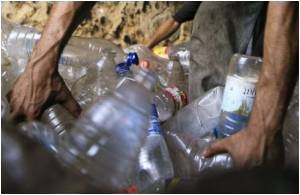BPA (bisphenol A) containing plastic is undoubtedly dangerous to the environment but scientists have now discovered an eco-friendly way of decomposing the plastic waste.

The scientists found that fungi grew better on pre-treated plastic, using its BPA and other ingredients as a source of energy and breaking down the plastic.
After 12 months, there was almost no decomposition of the untreated plastic, compared to substantial decomposition of the pre-treated plastic and zero release of BPA.
The new study is published in ACS' Biomacromolecules.
Source-ANI








